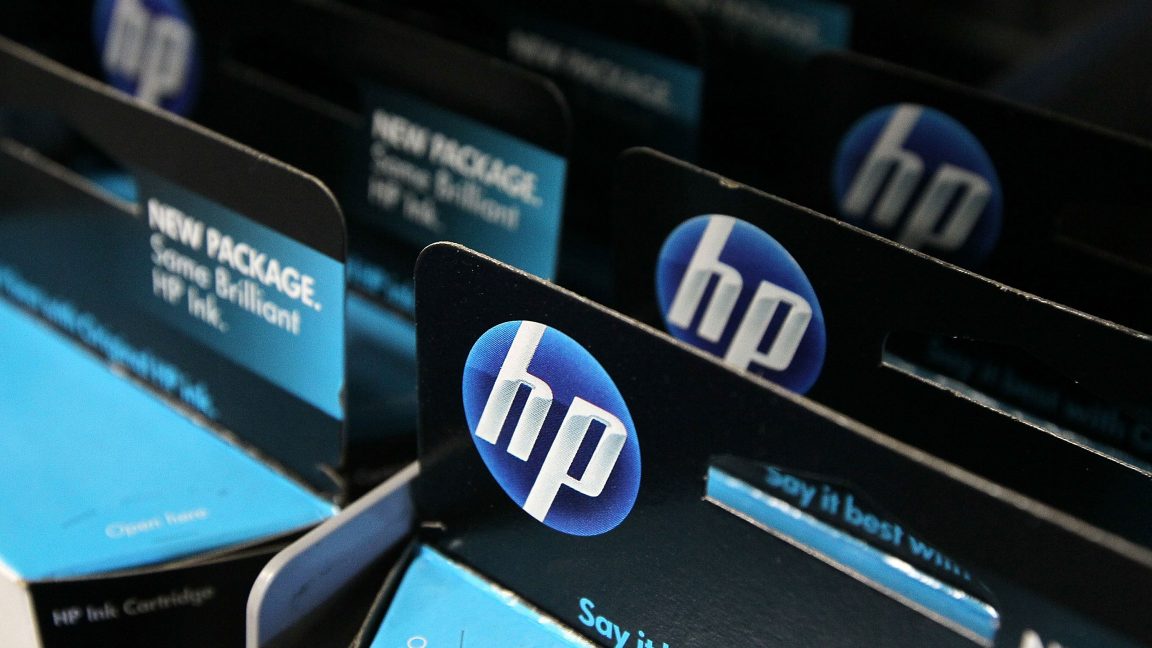
A United States District Court for the Northern District of California judge has signed off on a settlement agreement between HP and its customers, who sued the company for issuing firmware updates that prevented their printers from working with non-HP ink and toner.
In December 2020, Mobile Emergency Housing Corp. and a company called Performance Automotive & Tire Center filed a class-action complaint against HP [PDF], alleging that the company “wrongfully compels users of its printers to buy and use only HP ink and toner supplies by transmitting firmware updates without authorization to HP printers over the Internet that lock out its competitors’ ink and toner supply cartridges.” The complaint centered on a firmware update issued in November 2020; it sought a court ruling that HP’s actions broke the law, an injunction against the firmware updates, and monetary and punitive damages.
“HP’s firmware ‘updates’ act as malware—adding, deleting or altering code, diminishing the capabilities of HP printers, and rendering the competitors’ supply cartridges incompatible with HP printers,” the 2020 complaint reads.
HP calls using updates to prevent printers from using third-party ink and toner Dynamic Security. The term aims to brand the device bricking as a security measure. In recent years, HP has continued pushing this claim, despite security experts that Ars has spoken with agreeing that there’s virtually zero reason for printer users to worry about getting hacked through ink.
After years of litigation, in August 2024, HP and the plaintiffs reached a settlement agreement that Judge Susan Van Keulen approved on Tuesday [PDF].
Under the settlement agreement, HP doesn’t admit to any wrongdoing. It also won’t pay any monetary relief to customers impacted by the November 2020 firmware update.
However, HP agreed to pay $5,000 each to Mobile Emergency Housing Corp., Performance Automotive & Tire Center, and David Justin Lynch, who was eventually added to the complaint, “to compensate them for the services they performed on behalf of the classes,” HP said. It will also pay $725,000 in attorneys’ fees and expenses.
A win for HP users comes from the company's legal commitment to allow users of specific printers to decline firmware updates that would push Dynamic Security. The now-approved settlement terms state:
… HP has agreed to continue making certain disclosures to users of Class Printers about Dynamic Security and data collection, and to continue to allow users of Class Printers to either agree to install or decline to install firmware updates that include Dynamic Security features. The disclosures that HP has agreed to continue making include the disclosure that HP collects printer cartridge data from Class Printers through the HP Smart App, and that HP’s Dynamic Security measures are designed to block cartridges using a non-HP chip, and may be delivered to printers through periodic firmware updates.That requirement, however, only applies to specific HP printer models (referred to as “Class Printers”), which are listed below:
- HP Color LaserJet Pro M254DW
- HP Color LaserJet Pro MFP M180NW
- HP Color LaserJet Pro MFP M281FDW
- HP Color LaserJet Pro MFP M281CDW
- HP Color LaserJet Pro MFP M182NW
- HP Color LaserJet Pro MFP M183FW
- HP Color LaserJet Pro MFP M283CDW
- HP Color LaserJet Pro MFP M283FDW
- HP Color LaserJet Pro M255DW
- HP Color LaserJet Pro MFP M479DW
- HP Color LaserJet Pro MFP M479FNW
- HP Color LaserJet Pro MFP M479FDN
- HP Color LaserJet Pro MFP M479FDW
- HP LaserJet Pro M404N
- HP LaserJet Pro M404DN
- HP LaserJet Pro M404DW
- HP Color LaserJet Pro M454DN
- HP Color LaserJet Pro M454DW
- HP LaserJet Pro MFP M428DW
- HP LaserJet Pro MFP M428FDN
- HP LaserJet Pro MFP M428FDW
